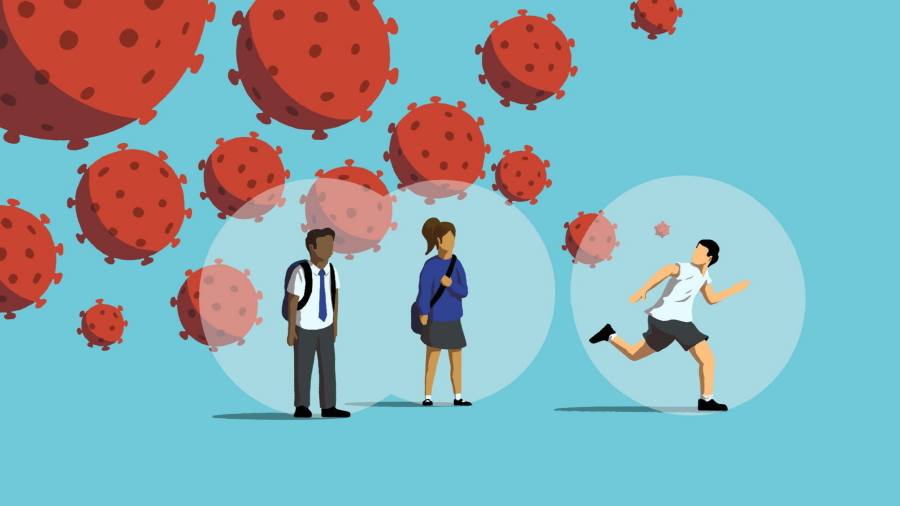
The writer is a science commentator
Respiratory syncytial virus is a little-known and hard-to-spell seasonal scourge that, like flu, most seriously affects children and older people. It usually triggers coughs and colds but can cause serious breathing difficulties in a small minority of infants.
RSV is so common that more than 80 per cent of UK children are infected by their second birthday — but case numbers plummeted during the Covid-19 pandemic. Measures such as masking, plus school and nursery closures, intended to slow the spread of Covid, also put the brakes on infection rates. Now the virus is resurgent, particularly in the US, with the wave hitting earlier than expected.
That has fuelled speculation that pandemic mitigations, including lockdowns, created a harmful “immunity debt”, with children left vulnerable through a lack of exposure to the usual cut and thrust of viral infections. But scientists have dismissed the concept, as applied to individual immunity, as misguided.
The discussion swirling around immunity debt shows how easy it is for a plausible-sounding theory to circulate as misinformation. In this case, misinformation risks promoting the unfounded assertion that infections are clinically beneficial to children, as well as feeding the revisionist narrative that Covid measures did more harm than good.
Professor Peter Openshaw, a respiratory doctor and immunologist who studies RSV and flu at Imperial College London, says the current “high and unseasonal” RSV wave is assumed to be a result of lockdowns causing levels of immunity to wane in children, parents and carers, paving the way for a greater number of infections.
But to frame this as an immunity debt, Openshaw warns, mistakenly suggests “that immunity is something we need to invest in, and that by protecting ourselves from infection we are building up a deficit that has ultimately to be repaid. This would not be a good message for public health: we would still have open sewers and be drinking from water contaminated with cholera if this idea were followed to its logical conclusion.” Delaying RSV infection may actually be beneficial, he adds, as the virus is deadliest to infants younger than six months. Globally among under-fives, one in 50 deaths is attributable to RSV.
Deborah Dunn-Walters, professor of immunology at the University of Surrey, says it is critical to distinguish between individual and population immunity (herd immunity) when scrutinising how pandemic measures may have altered the spread of non-Covid diseases. A smaller pool of people being infected during the pandemic can lead, after the lifting of measures, to a bigger pool of susceptible people. That fall in population immunity can fuel a surge simply because there are more people available to be infected (other factors, including the weather and virus severity, can also affect transmission).
But there is no evidence that an individual is worse off for having avoided earlier infection. “Immunity debt as an individual concept is not recognised in immunology,” Dunn-Walters says. “The immune system is not viewed as a muscle that has to be used all the time to be kept in shape and, if anything, the opposite is the case.” The constant onslaught of common pathogens such as cytomegalovirus, she adds, means the immune system begins to malfunction and slacken with age. She rejects the idea that infection is somehow good for health, saying vaccination is a far safer way of building population immunity.
Stephen Griffin, a virologist at Leeds University who believes paediatric pandemic vaccines were underused, argues we are still too complacent about childhood respiratory diseases. While there is no vaccine for RSV, Griffin acknowledges, “we can vaccinate against both flu and Covid — and yet we don’t.” Changing that norm, he says, could help to neuter the worst effects of a predicted “tripledemic” this winter. The UK Health Security Agency advises that eligible children should receive the flu vaccine.
The immunity debt theory holds broad appeal because it can be employed in so many ways. It seems to intuitively explain the current wave of respiratory illness. It is attractive to those who would downplay disease in children, and those who advocate for infection over vaccination. It provides a post-hoc justification for opposing measures such as masking, even though evidence suggests that such measures curbed Covid and virtually banished flu.
Immunity debt also plays to the idea that the ebb and flow of childhood illnesses are best left to nature — until one remembers that the entire childhood vaccination schedule is about keeping the worst of nature at bay.